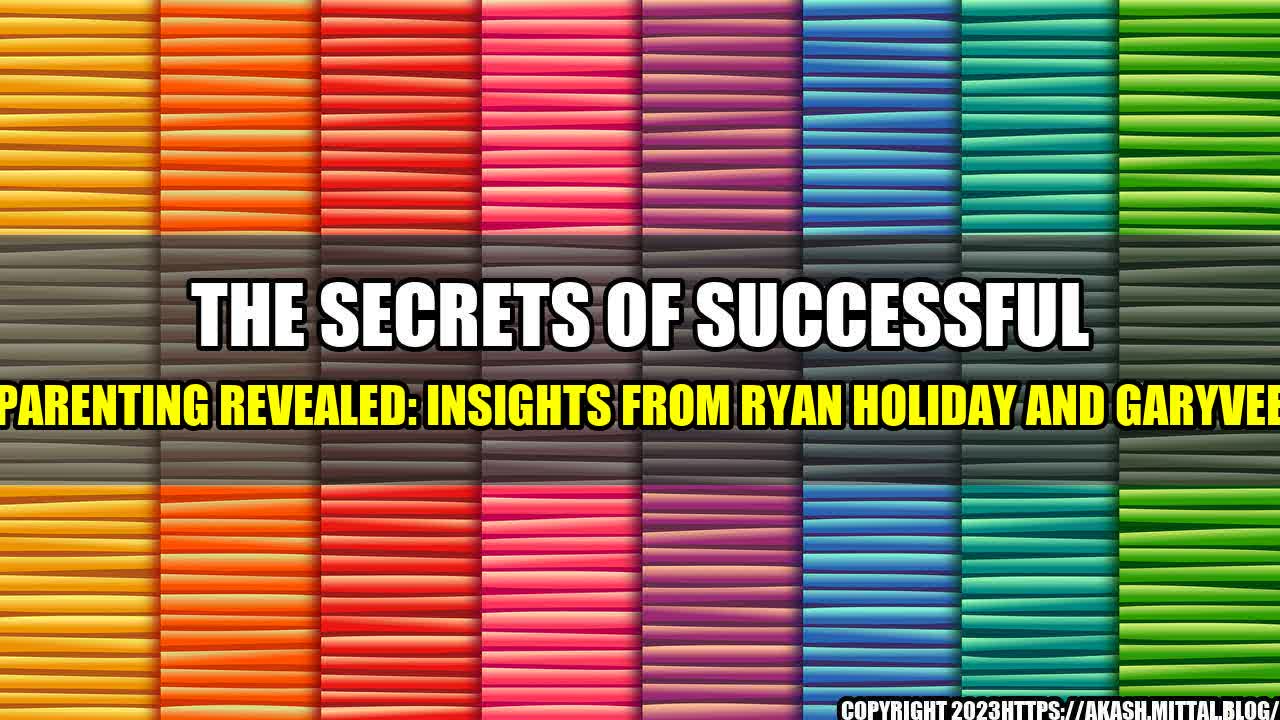
Parenting is one of the most rewarding, yet challenging, experiences in life. While there is no one-size-fits-all formula for raising happy and well-adjusted children, there are certain principles that can help parents navigate the ups and downs of parenthood. In this article, we will delve into the insights shared by Ryan Holiday, a bestselling author and father of two, on the GaryVee Audio Experience podcast. Holiday shares his experiences and perspectives on parenting, drawing from ancient wisdom and modern research.
Holiday is a proponent of Stoicism, an ancient philosophy that emphasizes self-control, rationality, and acceptance of the present moment. He applies the principles of Stoicism to his parenting style, focusing on what he can control and accepting what he cannot. This approach allows him to maintain a calm and centered demeanor even when his children are misbehaving or facing challenges.
One key Stoic concept that Holiday applies to parenting is the "dichotomy of control." This means recognizing what is within one's power and what is not. For example, parents cannot control their children's thoughts, feelings, or actions, but can control their own reactions and responses. By focusing on what they can control, parents can avoid feeling helpless or overbearing.
According to Holiday, Stoicism helps him be a more effective and empathetic parent. "When you're able to take a step back and see things for what they are, you're able to be more open and present with your children," he says. "You're not trying to fix them or mold them into something you want them to be. You're just there for them, supporting them in their own journey."
As a tech-savvy writer and entrepreneur, Holiday is well aware of the benefits and drawbacks of digital technology. He acknowledges that smartphones, social media, and other gadgets can be a double-edged sword for parents and children. On the one hand, they offer unprecedented access to information, entertainment, and communication. On the other hand, they can distract and disconnect us from the real world, and even harm our mental and physical health.
Holiday advises parents to be mindful of their own tech use, and to set clear boundaries and expectations for their children's tech use. He recommends having "tech-free zones" in the home, such as the dinner table or the bedroom, where phones and tablets are not allowed. He also stresses the importance of modeling good digital habits, such as not checking email or social media during family time.
Additionally, Holiday suggests using technology in a purposeful and intentional way, rather than just as a mindless pastime. For example, he uses educational apps with his children, and encourages them to create their own content, such as videos or podcasts. By incorporating tech into a broader learning and creative process, parents can help their children develop digital literacy and critical thinking skills.
Another aspect of parenting that Holiday focuses on is playtime. He believes that play is not only fun, but also essential for children's cognitive, social, and emotional development. However, he contends that not all play is created equal. Mindful play, according to Holiday, involves engaging with children in a meaningful and present way, rather than just going through the motions.
Holiday cites research that shows that children who experience "serve and return" interaction with adults, where they initiate a behavior and the adult responds in a positive way, have better social-emotional outcomes. He advises parents to actively engage in play with their children, such as building legos, playing board games, or doing crafts. By being fully present and attentive to their children's needs and interests, parents can create a positive and nurturing environment that fosters creativity, curiosity, and resilience.
In conclusion, successful parenting is a complex and multifaceted endeavor that requires patience, empathy, and mindful awareness. By adopting a Stoic mindset, being mindful of tech use, and engaging in mindful playtime, parents can create a positive and supportive environment that helps their children thrive.
#parentingtips #mindfulparenting #stoicism #technology #playtime
Curated by Team Akash.Mittal.Blog
Share on Twitter Share on LinkedIn